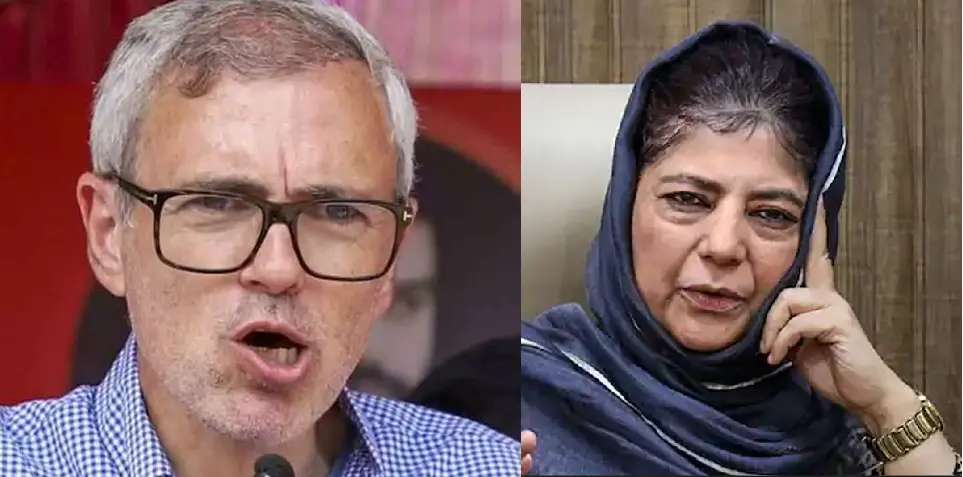
A heated exchange between Omar Abdullah and Mehbooba Mufti over the Indus Waters Treaty has sparked fresh debates
A fresh political controversy has erupted in Jammu and Kashmir as Chief Minister Omar Abdullah and former CM Mehbooba Mufti engage in a heated exchange over the Indus Waters Treaty (IWT) and the revival of the Tulbul Navigation Project. The debate, which started as a policy discussion, has quickly escalated into a war of words, highlighting deep-seated political divisions in the region. With India’s recent suspension of the Indus Waters Treaty following the Pahalgam terror attack, the issue has gained national and international attention.
The Indus Waters Treaty: A Historic Agreement Under Scrutiny
Signed in 1960 between India and Pakistan, the Indus Waters Treaty was brokered by the World Bank to regulate water-sharing between the two nations. Under the agreement, India controls the Beas, Ravi, and Sutlej rivers, while Pakistan has rights over the Indus, Chenab, and Jhelum rivers. Despite being hailed as one of the most successful water-sharing treaties globally, the pact has often been criticized for limiting India’s ability to utilize its own water resources.
Following the April 22 Pahalgam terror attack, which resulted in the deaths of 26 civilians, India decided to suspend the treaty, citing Pakistan’s alleged involvement in cross-border terrorism. This move has reignited debates over the fairness of the treaty and its impact on Jammu and Kashmir’s water rights.
Omar Abdullah’s Call for Tulbul Navigation Project Revival
Jammu and Kashmir CM Omar Abdullah took to social media to advocate for the revival of the Tulbul Navigation Project, a water regulation initiative on Wular Lake in North Kashmir. The project, originally launched in the 1980s, was abandoned due to Pakistan’s objections under the Indus Waters Treaty. Abdullah argued that with the treaty now temporarily suspended, India should resume work on the project to enhance navigation on the Jhelum River and boost power generation in winter months.
His remarks quickly sparked controversy, with critics questioning whether such a move could escalate tensions between India and Pakistan. Abdullah defended his stance, stating that opposing an unfair treaty was not warmongering, but rather an effort to correct a historic injustice.
Mehbooba Mufti’s Sharp Rebuttal
Former CM Mehbooba Mufti, leader of the People’s Democratic Party (PDP), strongly opposed Abdullah’s remarks, calling them “irresponsible and dangerously provocative”. She warned that weaponizing water could internationalize what should remain a bilateral issue between India and Pakistan. Mufti emphasized that Jammu and Kashmir has already suffered immensely due to ongoing conflicts and that peace should be prioritized over political rhetoric.
In response, Abdullah accused Mufti of trying to appease Pakistan, reigniting old political rivalries. Mufti countered by referencing Abdullah’s grandfather, Sheikh Abdullah, who had once advocated for accession to Pakistan before aligning with India. The exchange quickly turned personal, with both leaders trading barbs over their respective political legacies.
Political Implications and Regional Impact
The spat between Abdullah and Mufti underscores the deep divisions within Jammu and Kashmir’s political landscape. While Abdullah’s National Conference (NC) has historically opposed the Indus Waters Treaty, Mufti’s PDP has taken a more diplomatic approach, advocating for bilateral resolutions rather than unilateral actions.
The controversy also raises questions about India’s future stance on water-sharing agreements. With the Indus Waters Treaty now in limbo, policymakers must decide whether to renegotiate terms or permanently withdraw from the pact. Additionally, the revival of the Tulbul Navigation Project could have economic and environmental consequences, affecting water availability downstream.
Conclusion
The Indus Waters Treaty debate has once again brought Jammu and Kashmir’s water rights into the spotlight. As Omar Abdullah and Mehbooba Mufti continue their political feud, the larger question remains—should India renegotiate the treaty or abandon it altogether? With tensions between India and Pakistan already high, the outcome of this debate could have far-reaching consequences for regional stability and water security.
1 thought on “Omar Abdullah Mehbooba Mufti Spat Over Pak Indus Waters Treaty Pact Sparks Political Storm”